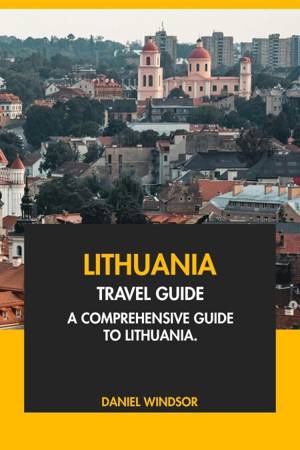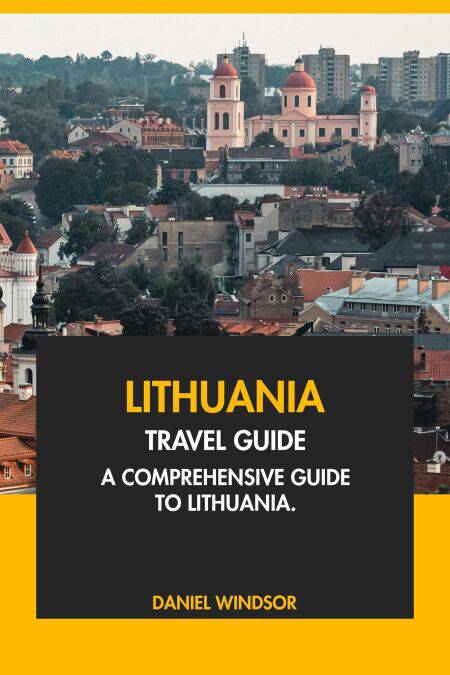
- Retrait gratuit dans votre magasin Club
- 7.000.000 titres dans notre catalogue
- Payer en toute sécurité
- Toujours un magasin près de chez vous
- Retrait gratuit dans votre magasin Club
- 7.000.0000 titres dans notre catalogue
- Payer en toute sécurité
- Toujours un magasin près de chez vous
Description
Lithuania, a hidden gem in the Baltic region of Europe, is a country steeped in history, rich in culture, and blessed with breathtaking landscapes. Nestled between Latvia and Poland, this small yet vibrant nation has a unique identity shaped by centuries of complex history, diverse cultural influences, and resilient spirit. This eBook aims to provide a comprehensive guide to Lithuania, inviting readers to discover the beauty and charm of this Baltic state.
With a population of approximately 2.8 million people, Lithuania is a place where old-world charm coexists with modern sophistication. Its capital, Vilnius, is an architectural marvel, characterized by a blend of Gothic, Baroque, and Renaissance styles. The Old Town of Vilnius, a UNESCO World Heritage site, is filled with narrow cobblestone streets, historic buildings, and quaint cafes, making it a perfect starting point for exploring the nation's rich history. Visitors can stroll through the picturesque streets, enjoying the stunning architecture and vibrant atmosphere that define this charming city.
Lithuania's journey through history is as captivating as its landscapes. Once a powerful state known as the Grand Duchy of Lithuania, the country has faced numerous challenges over the centuries, including invasions, occupations, and struggles for independence. These historical events have shaped the national identity, and today, Lithuanians take immense pride in their cultural heritage and the resilience that has allowed them to thrive as an independent nation since 1990.
As one traverses Lithuania, it becomes evident that its natural beauty is as diverse as its cultural landscape. From the pristine beaches of the Curonian Spit to the lush forests of Aukštaitija National Park, the country offers a plethora of outdoor activities for nature enthusiasts. Whether it's hiking, cycling, or simply enjoying a picnic by a serene lake, Lithuania's landscapes provide a tranquil escape from the hustle and bustle of city life.
Culinary experiences in Lithuania are equally compelling, with traditional dishes that reflect the country's agricultural roots. Traditional meals often feature hearty ingredients such as potatoes, rye bread, and seasonal vegetables. Local specialties like cepelinai (potato dumplings) and šaltibarščiai (cold beet soup) offer a delicious taste of Lithuanian cuisine, inviting visitors to indulge in the flavors that have been passed down through generations.
Moreover, Lithuania's arts and cultural scene is thriving, with numerous galleries, theaters, and festivals that celebrate creativity and expression. From contemporary art exhibitions in Vilnius to folk music festivals in rural areas, the country showcases its artistic diversity, providing a platform for both established and emerging talents.
Tourism in Lithuania has been on the rise, attracting travelers from around the globe who seek to experience its unique charm. Whether you're interested in exploring the rich history of its cities, immersing yourself in the natural beauty of its landscapes, or indulging in the local cuisine, Lithuania has something to offer every type of traveler.
This guide is designed to provide insights into various aspects of Lithuania, including its history, cultural heritage, travel tips, and must-visit attractions. Each chapter delves into a specific theme, offering a detailed exploration of what makes Lithuania a remarkable destination. Whether you're planning a visit, conducting research, or simply seeking to learn more about this fascinating country, we invite you to embark on a journey to discover Lithuania's treasures.
Spécifications
Parties prenantes
- Auteur(s) :
- Editeur:
Contenu
- Langue:
- Anglais
Caractéristiques
- EAN:
- 9798227135490
- Date de parution :
- 23-10-24
- Format:
- Ebook
- Protection digitale:
- /
- Format numérique:
- ePub

Les avis
Nous publions uniquement les avis qui respectent les conditions requises. Consultez nos conditions pour les avis.






